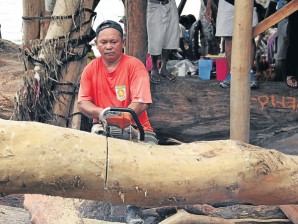Killer logs cut to build homes, to rebuild lives

SHELTER FOR HOMELESS Iligan City officials have given the go signal to cut the thousands of logs that destroyed hundreds of houses at the height of the flash floods brought by Tropical Storm “Sendong” and use the timber to build shelters for the homeless survivors. Richel V. Umel/Inquirer Mindanao
ILIGAN CITY—Logs, including those that pummeled many flood victims to death here at the height of the flash floods spawned by Tropical Storm “Sendong,” are being tapped to provide shelter to survivors.
There’s at least 5 kilometers of coastline here clogged with logs.
The effort was spearheaded by the city government and the nongovernment organization Ecosystems Work for Essential Benefits (Ecoweb).
Volunteers for the shelter program have started scouring the beaches of Barangays (villages) Tibanga, Santiago, Hinaplanon and Acmac for logs that can be made into lumber.
The lumber will be used to build some of the houses for thousands of families left homeless by the flooding.
Article continues after this advertisementRegina Antequiza, Ecoweb executive director, said that as of Tuesday afternoon, dozens of logs had been recovered and formed into lumber by volunteers using chainsaws.
Article continues after this advertisement“What we intend to do is use the lumber for the reconstruction of houses instead of ending up in the hands of unscrupulous illegal loggers,” Antequiza said.
Melvin Anggot, city information officer, said some people had tried to bribe officials so they could get the logs that the floods had washed away on December 17.
“They are illegal loggers and we will pursue charges against them when the situation normalizes,” Anggot said.
With the supply of lumber from recovered logs assured, the city government is hoping that the construction of houses in relocation sites can start immediately, Mayor Lawrence Cruz said.
“We are moving fast and we want this problem solved soon. We have identified and acquired relocation sites,” he said.
Cruz said that based on government figures some 4,000 homeless families had been included in the program’s initial phase.
He said thousands claimed to have lost their homes in the floods. “Some of them appeared to be just pretending. That’s why we are validating their claims,” he said.
Cruz said Social Welfare Secretary Corazon Soliman had pledged shelters for other victims who could not be accommodated in the local resettlement program.
In Cagayan de Oro City, displaced residents of the second congressional district may have to spend two more months in tent cities before they can move to their new homes, which are being jointly built by the government and good Samaritans.
Houses finished in February
Cagayan de Oro Representative Rufus Rodriguez said the construction of the houses for Sendong victims could be finished in February. The houses are being built on a 4-hectare lot in Barangay Gusa and on a 10-ha piece of property in Barangay Indahag.
Relocation sites have also been identified in Barangays Lumbia and Calaanan for those who used to live on the western bank of the Cagayan River, Rodriguez said.
The Jesuit-owned Xavier University has granted the government usufruct rights to its 5-ha property in Barangay Lumbia.
Usufruct is the legal right granted to a person or entity to use and derive profit or benefit from property that either belongs to another person or which is under common ownership, as long as the property is not damaged or destroyed.
Cagayan de Oro Councilor Nadya Emano said the city had also allocated 9 ha in Barangay Calaanan for the relocation of Sendong victims.
Generosity
The property, she said, was part of the 64-ha area that the city government bought in 1996 for its resettlement program.
Emano said a Chinese-Filipino businessman, who wished to remain anonymous, offered to bankroll the building of an initial 300 houses in Calaanan for storm victims.
The businessman has offered to build about a total of 1,000 houses on the property, she said.